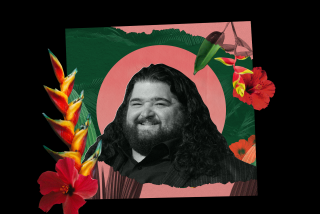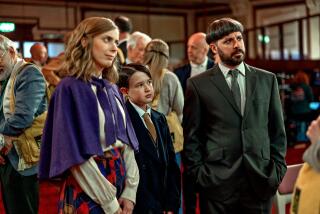Survival of the Unlikely
- Share via
“Survivor” mania marches on with the publication this week of the series’companion book, “Survivor: The Ultimate Game” (TV Books, $17.95), written by Mark Burnett, the executive producer of the CBS phenomenon, with adventure writer Martin Dugard.
Burnett will make an appearance tonight in Century City to sign books and discuss the behind-the-scenes scoop on Richard, Rudy, Susan, Kelly and the 12 other castaways of Pulau Tiga. The book includes in-depth interviews with each contestant, expanded treatment of the final tribal council and photographs of the contestants and the camps.
TV Books is printing 180,000 copies of “Survivor: The Ultimate Game,” the largest first printing in the company’s five-year history.
CBS begins repeats of “Survivor” Friday evening for 13 straight nights, airing opposite NBC’s coverage of the Olympic Games from Sydney, Australia.
The next installment of “Survivor,” in the Australian Outback, is to premiere Jan. 28 after the Super Bowl.
Burnett, 40, who is also the founder of Eco-Challenge, a popular outdoor multi-event endurance competition, took time out from his hectic schedule to talk about his new book and the amazing success of “Survivor.”
Question: Do you think you will be bombarded with audition tapes for “Survivor: The Australian Outback” at the book signing?
Answer: Oh, wow! I think that’s entirely possible. Sometimes when I’m out just socially, people will recognize me or find out what I do, and that’s quite often the case. They want to get on “Survivor.” People are really taken with the idea of the adventure of the whole thing.
Really, what we learned from “Survivor” is that people seemed so much more interested in the adventure than the money. Toward the end, when there were six left, money became much more real.
Q: Have you chosen the castaways for the second “Survivor”?
A: In year one we only had 6,000 people apply and year two, 49,000. We actually interviewed 800 in person, and from those 800 in person, we are now down to the last 50. Those last 50 are spending 10 days in Los Angeles. [Our people] go through their background checks and seven hours of psychological tests, which are really similar to the tests given to the law enforcement people--trying to judge stability and whether someone would act overly aggressively in a certain situation.
We have a duty to make sure that people are not going to be a threat to themselves or indeed to others. We did a good job the first time. There was no physical violence whatsoever, just a lot of head games.
Q: Did the “Survivor” castaways behave differently, though, once they got on the island?
A: Yes, everybody. I have done enough of this kind of stuff with Eco-Challenge for seven years [that] I do realize under the duress of nature in the raw in itself--forget about the peer pressure of the game--everyone acts differently, and no one knows how they are going to react.
What you can do only is try to choose 16 people who are all uniquely interesting and fairly driven and knowing something will come out of it and, of course, it did. An example of that is that nobody knew that B.B. would be so aggressive. He seemed to be a grandfatherly [type], and he wasn’t. He was quite tough. Nobody knew that Greg was the most unlikely person to be as quirky and strange as he was.
Q: Were there any surprises regarding Rudy?
A: Rudy I expected to be far more bigoted and homophobic than he was. He became good friends with Richard, and I think that’s such a great growth of person who spent 45 years in the military to be in a nonmilitary situation and deal with it so admirably. He could have become a mean-spirited Archie Bunker. Instead, everybody loves Rudy.
Q: Did you write the book while you were on the island?
A: It was written in real time. The funny thing about it was that the first line of the book says, “Richard Hatch is destined to be the first person voted off the island.” That’s how I really felt on day one. I thought, “This guy won’t last one hour” because he climbed in that tree and was sulking and trying to be a corporate trainer when these people had no interest in listening to him.
And little did I realize how clever he was and how he would manipulate and be able to change his own strategy so well. The last line is, “The winner is Richard.”
Q: Were you worried that someone from the publishing house would leak the winner’s identity?
A: What actually happened was that Peter Kaufman [head of TV Books] and two other people at TV Books got to read the manuscript and signed a confidentiality agreement. The book couldn’t go to the printers until 11 p.m. on Aug. 23 (the day of the final episode). That was the deal. Only three people at TV Books were trusted with the secret.
Q: “Survivor” is the pop culture phenomenon of the year. But CBS’ “Big Brother,” though not a failure, hasn’t lived up to expectations. Instead of conflict, the housemates have turned into pals. Why did “Survivor” succeed? Was it the casting or the situation or both?
A: Two things. You have to be good in casting, which I think my team was, as evidenced [by] what we have done so far. But secondly, the stakes have to be real.
Surviving on an island with rats, snakes and bugs and $1 million at stake is a real jeopardy and a real payoff, which makes ordinary people who are driven react in a certain way that can become dramatic. If you don’t have A-type people who are not likely to be driven and you put them in a completely boring situation, it is going to be boring.
Q: One of the most interesting aspects of the book is the fact that the castaways and the production crew were under threat of modern-day pirates. Can you talk about who they were and what you had to do to prevent their coming in contact with the castaways?
A: The island turned out to be a secret midway point for trading of contraband between pirates. They used the island as a place to come from offshore. They would hide in the coves of the island until darkness. They drove those “Miami Vice”--style cigarette boats.
One day I was in a speedboat with the driver heading to Taigi Beach, and I saw what looked like some low craft in the water about 500 meters--right on the island shore. I thought it was the castaways of Taigi on their raft on their fishing trip. As I went over there, this thing came to life and raised up in the water and it came toward me. We turned my speedboat, and they quickly caught us; they had engines like a race car. They showed us their weapons.
We already had security on the island. We had the foresight to hire security. They got in touch with the Malaysian government, [which] immediately sent a naval gunboat to the island and military operatives. Unbeknown to the castaways, there were always two military special forces guys with automatic weapons hiding in the jungle [with] full sight of the castaways.
Q: What is the “Survivor” location like in Australia?
A: It is on the mainland, and it is at the beginning of the outback; it is remote and very hard. An example: I got a satellite phone call from my crew who are preparing the site. They said it was so hot they couldn’t wear earrings because the metal was heating up so much it was burning them.
Q: Will there be a third installment of “Survivor”?
A: Well, obviously, this is a very important [franchise] for CBS. I have a full-time staff researching islands.
BE THERE
Mark Burnett signs copies of his book “Survivor: The Ultimate Game,” tonight at 7:30 at Brentano’s Century City, 10250 Santa Monica Blvd, (310) 785-0204.
Repeats of “Survivor” begin Friday and continue daily, except Sundays, through Sept. 29, 9 p.m. on CBS.
More to Read
The complete guide to home viewing
Get Screen Gab for everything about the TV shows and streaming movies everyone’s talking about.
You may occasionally receive promotional content from the Los Angeles Times.







